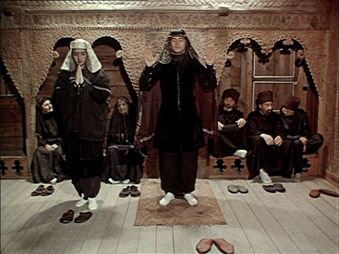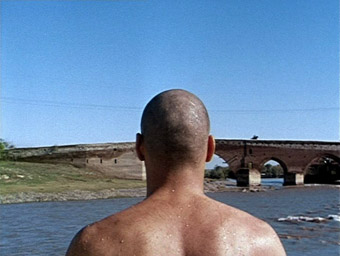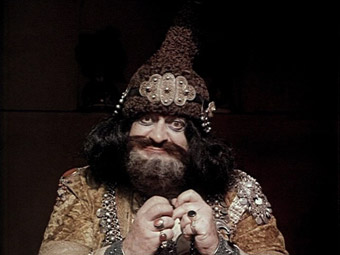|
Imagine a set of tick boxes designed to frighten addicts of mainstream western cinema away from any movie that they'd rather eat stale tofu than watch, and Ashik Kerib should score enough points to send them scurrying. For a start, it's Russian. Uh-oh. It's also in the Russian language, with subtitles. Oh dear no. It's based on a short story by Russian poet Mikhail Lermontov, itself inspired by an ancient folk tale. Oh goody. It also breaks with traditional cinematic storytelling techniques and experiments with form. That's it, I'm out of here. Of course, the very elements that will see the film dismissed without further investigation by Michael Bay enthusiasts should act as an instant hook to those with more adventurous tastes. And it really is a hook worth biting.

Ashik Kerib [Ashug-Karibi] is the last film completed by Armenian experimentalist Sergei Parajanov, a man whose work is now held in extremely high regard and has one many awards, but who had a consistently rough ride on home turf during his working life. Several of his films were banned by the Soviet authorities, and in 1977 he was sentenced to five years in a hard labour camp on a trumped-up charge of "the rape of a Communist party member and the propagation of pornography." Fellow Soviet filmmaker Andrei Tarkovsky came soundly to his defence and a prestigious group of international filmmakers and artists – including the likes of Buñuel, Truffaut, Antonnioni, Godard and Fellini – launched a protest in his support. He was released after serving four years of his sentence (thanks to the efforts of French poet and novelist Louis Aragon, Russian poet Elsa Triolet and the American writer John Updike) and temporarily abandoned filmmaking for other artistic pursuits. Then in 1982 he was arrested again, this time for bribery, and although he spent less than a year in jail, his health was permanently damaged by the experience. In 1984 he returned to filmmaking with The Legend of the Surami Fortress (also coming up for an Artificial Eye DVD release), which he followed with the short film Arabesques on the Pirosmani Theme and the feature Ashik Kerib. He sadly died before shooting was complete on his 1990 film The Confession.
As you might expect from a film based on a story inspired by an ancient folk tale, Ashik Kerib has the sort of narrative development and character arcs that served as working models of Joseph Campbell's The Hero with a Thousand Faces. Ashik Kerib himself is a minstrel in love with the beautiful Magul, the daughter of a rich merchant who rejects the idea of a musical pauper for a son. Kerib thus leaves his village, determined to make his fortune and return to marry Magul, who in turn pledges to wait for him. But unscrupulous rival Kushud-Bek also has his eye on Magul, and when the travelling Kerib is tricked of his clothing and pronounced dead to his family, the way appears open for Kushud-Bek to claim his bride.
Campbell enthusiasts will find many of the stock folk tale characters here. We have a hero who sets off to prove his worth to his chosen princess, a quest instigated by her father; a villain with designs on the lady; and a donor/helper who transports the hero great distances on an enchanted white steed and furnishes him with the means to prove his identity and claim his bride. All of which provides Parajanov with a foundation that just about any audience will be familiar with in one form or another, and freedom to experiment with form in the knowledge that even if viewers are left occasionally bemused by the detail, they should have no trouble with the plot. And the joy of this particular tale really does all lie in the manner of its telling.

Although it unfolds in linear fashion, the story is broken up into short titled chapters and presented almost as a series of moving tableaux. Angular views are rare, the emphasis being on shots in which characters are positioned in front of walls, buildings or landscapes and photographed head-on in the manner of early paintings or murals, artwork that intermittently replaces the live action to suggest the makeup of a harem or a travelling caravan, and so forth. There's both an economy and a poetry to this approach, stripping the story down to its key events that at the same time provide a series of stand-alone sequences that can be enjoyed for their individual artistry. Some are captivating for their framing alone – the shot of the back of Karib's head as he watches the thieving horseman depart – while others achieve a spellbinding blend of sound and imagery, as with Kerib's departure to seek his fortune, a mix of dance and performance given aural gravitas by a soundtrack whose traditional instrumental music is hypnotically underscored by twisting drones, and whose symbolic importance only becomes clear later when the entire shot is repeated with a change of costume and narrative purpose.
The dialogue is clearly post-dubbed, but the film makes no secret of it and even makes this part of its storybook fabric, with entire conversations taking place between characters whose mouths never open, creating the sense that a multi-voiced narrator is guiding us through their adventures. Silence is rare and music an almost constant companion, a fabulous range of traditional tunes that are occasionally (and unexpectedly) joined by more modern instruments. The musical emphasis is, of course, appropriate for a tale of a character seeking his fortune through his instrumental skills and adds to the film's enchanting theatricality. This is further enhanced by Parajanov's staging of some sequences in single wide and mid shots, the locked down camera drifting sideways to follow characters as they move or to reveal more of the location or action of a scene.
Visually arresting but always purposeful in its framing, Ashik Karib makes effective – if sometimes obvious – use of black/white symbolism and is laced with moments of surrealistic intriguge and unexpected, even absurdist humour (Karib steals a guard's costume, then rips off another's beard and moustache to complete the disguise). It's a live-action storybook whose playful approach and sometimes divine marriage of music and imagery make for a most poetic swan song by one of the true artists of twentieth century Russian cinema, and is a whole lot more fun than that serious sounding summary might suggest.
Framed in what appears to be the original 1.33:1 ratio, the transfer is noticeably superior to those on both War & Peace or Dersu Uzala, two previous Artificial Eye ports of Russian Film Council DVDs. Detail is very good and the contrast generally excellent, while the colour feels natural but vibrant when it needs to be. It also upscales well to HD. Grain is evident and there is some flickering in places, but on the whole, a very nice job.

You can choose between either the original mono or the original 5.1 surround tracks – both are slightly clipped on the louder trebles, but the 5.1 shines in other respects. The surrounds are very specifically used – a released dove flies from the font to the back of the room – and provide a more inclusive sense of place. If you've ever wanted to know what being in the middle of a flock of sheep sounds like, here's your chance.
S. Paradzanov (24:18)
Titled in that unfussy Russian manner of first initial followed by surname, this documentary of director Sergei Parajanov (I'm going with the more frequently found western spelling of his name, which is different to the one on the extras menu) has a rough-and-ready, home made feel, like it was put together by one of Parajanov's less cinematically experienced mates. But it's a precious thing nonetheless, for its glimpses of the director at work and for the interview material with him, in which he talks about his childhood, his adult woes with the authorities, and his development as a filmmaker. There are some intriguing quotes here, from his claim that you can't learn to direct but have to be born to it, to his amusing suggestion that what others describe as invention he explains as "the truth I thought up." Includes footage of the director at the Munich Film Festival for the world premiere of this very film. Poignantly, he tells the audience that he is so happy with the film he'd like to die immediately after making it.
M. Lermontov Archive (12:41)
A po-faced Russian documentary on the celebrated poet and writer whose short story Ashik Kerib the Lovelorn Minstrel was the basis for Gia Badridze's screenplay and Parajanov's film. He actually led an interesting life and died in a duel, the details of which are supplied here. He's painted very much as a desperately lonely and melancholy figure who apparently learned English purely to read Byron, a similarly tortured literary soul, we are assured.
There's also a link here to Lermentov's bit of a 36 page Filmography that provides biographies and filmographies of key members of the film's cast and crew.
Photo Gallery provides a rolling gallery of publicity still that lasts about a minute.
The Minstrel's Song (Mugam) (4:59)
One of the tunes from the film's soundtrack, set to juddery monochrome ethnological footage of the district in which the film is set and the people who work its land.
If your only exposure to the cinema of Sergei Parajanov is his internationally screened The Colour of Pomegranates (it was mine until now) then this Artificial Eye release should get you thirsting for more. A richly imaginative, very enjoyable and sometimes spellbinding movie whose plot may become lost in the set-pieces about two thirds of the way in, but whose visuals, music and storytelling style completely won me over. Recommended.
|